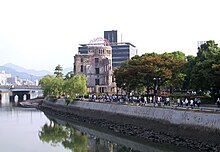The role of the bombings in Japan's surrender and the U.S.'s ethical justification for them has been the subject of scholarly and popular debate for decades. J. Samuel Walker wrote in an April 2005 overview of recent historiography on the issue, "the controversy over the use of the bomb seems certain to continue." He wrote that "The fundamental issue that has divided scholars over a period of nearly four decades is whether the use of the bomb was necessary to achieve victory in the war in the Pacific on terms satisfactory to the United States."
Supporters of the bombings generally assert that they caused the Japanese surrender, preventing casualties on both sides during Operation Downfall. One figure of speech, "One hundred million [subjects of the Japanese Empire] will die for the Emperor and Nation,"served as a unifying slogan, although that phrase was intended as a figure of speech along the lines of the "ten thousand years" phrase. In Truman's 1955 Memoirs, "he states that the atomic bomb probably saved half a million U.S. lives— anticipated casualties in an Allied invasion of Japan planned for November. Stimson subsequently talked of saving one million U.S. casualties, and Churchill of saving one million American and half that number of British lives."Scholars have pointed out various alternatives that could have ended the war without an invasion, but these alternatives could have resulted in the deaths of many more Japanese.Supporters also point to an order given by the Japanese War Ministry onAugust 1, 1944, ordering the execution of Allied prisoners of war when the POW camp was in the combat zone.
Those who oppose the bombings cite a number of reasons for their view, among them: a belief that atomic bombing is fundamentally immoral, that the bombings counted as war crimes, that they were militarily unnecessary, that they constituted state terrorism,and that they involved racism against and the dehumanization of the Japanese people. Another popular view among critics of the bombings, originating with Gar Alperovitz in 1965 and becoming the default position in Japanese school history textbooks, is the idea of atomic diplomacy: that the United States used nuclear weapons in order to intimidate the Soviet Union in the early stages of the Cold War.The bombings were part of an already fierce conventional bombing campaign. This, together with the sea blockade and the collapse of Germany (with its implications regarding redeployment), could also have led to a Japanese surrender. At the time the United States dropped its atomic bomb on Nagasaki on August 9, 1945, the Soviet Union launched a surprise attack with 1.6 million troops against the Kwantung Army in Manchuria. "The Soviet entry into the war", argued Japanese historianTsuyoshi Hasegawa, "played a much greater role than the atomic bombs in inducing Japan to surrender because it dashed any hope that Japan could terminate the war through Moscow's mediation".culled from Wikipedia.org


No comments:
Post a Comment